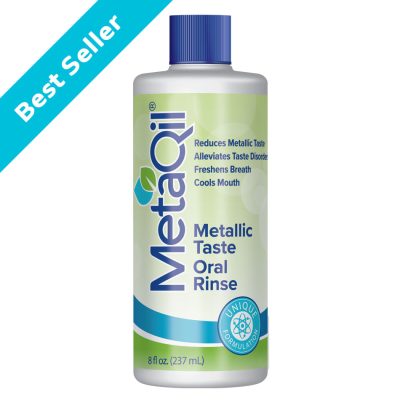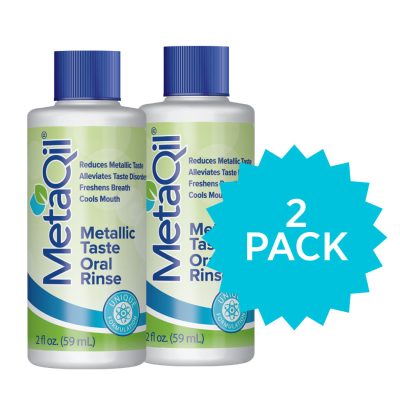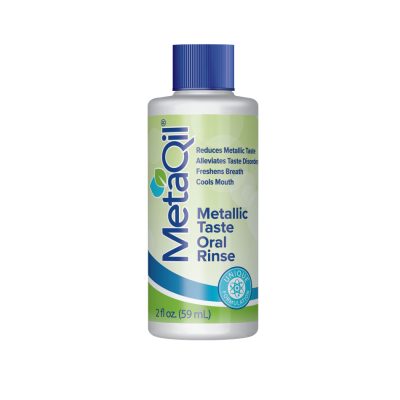

While eating certain pungent foods such as onions, garlic, fish, etc., you may experience a temporary metallic taste, this is not considered dysgeusia.
Typically, the flavors of foods do not affect your taste or create metallic taste symptoms. Metallic taste is when you experience a persistent, altered sense of taste due to factors including chemotherapy, radiation, COVID-19, medication, or GERD.
However, metallic taste can affect the way your food tastes, leading to poor nutritional choices. People with metallic taste tend to over season foods or choose saltier, spicier, or more sugary foods. This nutritional change can lead to other health complications or problems.
Chemo and radiation therapy may cause taste and smell disturbances by destroying taste and olfactory receptor cells. In a study among cancer patients, 29 of 37 (78%) participants described their perceived taste change as metallic. The change was reported after at least two cycles of various chemotherapy treatments. It’s especially common in patients who receive radiation on the neck and head area(s).
The cells in normal taste buds regenerate every 10 days. When radiation therapy kills those cells, they take time to replenish. During this time patients experience taste alterations. Click here to learn more about cancer treatment and metallic taste.
Some people who have had COVID-19 experience metallic taste symptoms. This is a result from the way COVID-19 affects our body and taste receptors.
With most viral infections, metallic taste is a common side effect as a result of cell damage. According to the National Health Institute, the COVID-19 virus may affect the olfactory organ (smell) creating dysfunction and a loss or altered taste. Click here to learn more about COVID-19 and metallic taste.
Gastroesophageal Reflux Disease (GERD) is a chronic medical condition that is characterized by stomach acid or bile flowing up into the food pipe. This causes oral irritation and discomfort. It is common that GERD can cause metallic, acidic, sour or bitter taste in the mouth. The two main factors that cause taste alterations: acid reflux itself, and the medications taken to remedy the disease. Click here to learn more about GERD and metallic taste.
There are over 500 medications that can cause metallic taste or other taste alterations as side effects. Here is a list of medication categories that have been known to cause metallic taste:
Parkinson’s Medication: such as Levodopa
Common colds, respiratory and middle ear infections can impact the sense of taste and smell. Allergies that affect the respiratory system can cause metallic taste as well. Loss of taste can be a result of either physical blockage or neurological damage in the nasal canal.
Exposure to arsenic, benzene, carbon disulfide, cadmium, sulfur dioxide, chlorine, chromium fumes, and cigarette smoke can induce smell or taste disturbances. Lead poisoning can also cause metallic taste. Exposure to zinc and copper fumes may create metallic taste symptoms as well.
Environmental toxins can cause severe disruptions in taste and smell. They can enter the system through the bloodstream or inhaled air. Click here to learn more about chemical exposures and metallic taste.
The nervous system is responsible for communicating taste signals to the brain. If something is not working as it should within this complex system, the sense of taste can be affected in different ways. Some CNS-related diseases such as dementia, Alzheimer’s and Parkinson’s often cause metallic taste. Click here to learn more about dementia and metallic taste.
Food allergies, such as to shellfish and tree nuts, have been known to cause metallic taste. More importantly, metallic taste in the mouth has been identified as an early symptom of anaphylactic shock. Anaphylactic shock is a very serious allergic reaction that requires immediate medical attention.
Metallic taste begins almost immediately after a person with an allergy is exposed to their allergy trigger. The taste change is soon followed by other symptoms. These may include itching of the mouth, face, hands or feet, sweating, headache, or disorientation. Click here to learn more about food allergies and metallic taste.
Surgery involving the middle ear can cause stretching or sectioning of the nerve, creating taste loss. In addition, operations on the brain can occasionally cause taste alterations. General anesthesia itself can affect the sense of taste as well. Learn More
Poor oral hygiene can cause bacteria to grow in the mouth. Bacteria itself often causes bad breath. As a result, infections and diseases may alter taste and breath and may pose a more serious risk to overall health. Click here to learn more about poor oral hygiene and metallic taste.
People with metallic taste often have aversions to certain foods because foods taste different or unpleasant. As a result, people may eat less overall or make poor food choices in general. To mask unpleasant tastes, dysgeusia patients often choose to eat saltier and overly sweet foods. As a result, an increased intake of sodium and sugar may cause complications and negatively impacts overall health. One study showed that some patients may also start drinking water more. This creates a risk of polyuria, incontinence and higher risk of falls in the elderly.
Usually, metallic taste treatment focuses on resolving the underlying cause, such as COVID-19 or poor oral hygiene. However, it may be difficult to change a patient’s routine. Some causes of taste changes are hard to remove. For example, some medications, like those for blood pressure, are not easy to switch without the risk for other health problems.
In many cases, metallic taste may take a long time to go away. MetaQil is the only oral rinse scientifically designed to relieve altered taste symptoms and restore your normal sense of taste.
We understand the discomfort that persistent taste changes may cause. That’s why we developed MetaQil, a product to relieve dysgeusia symptoms. MetaQil is a simple mouth rinse that provides comfort without interfering with necessary medications and a healthy diet.
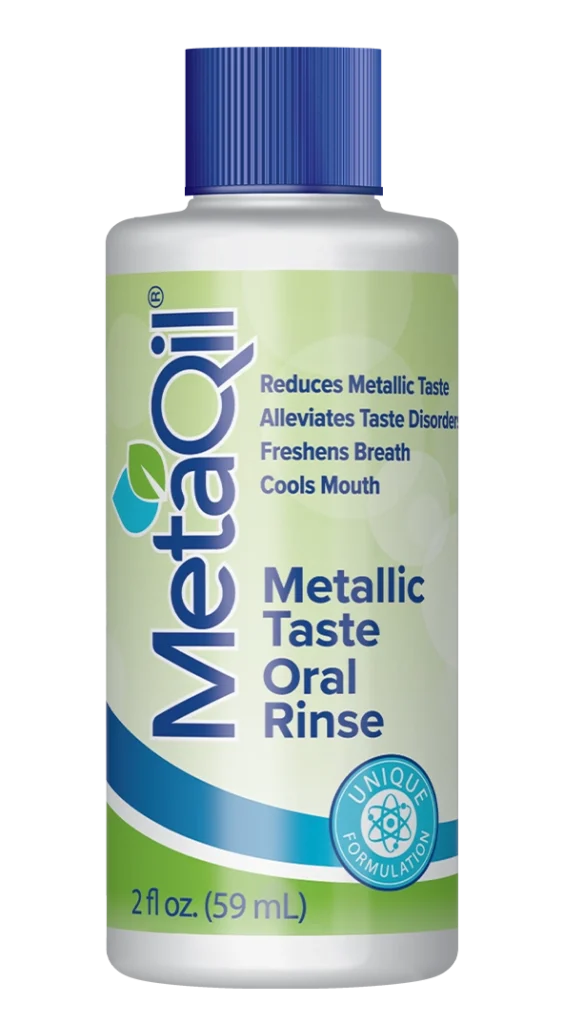
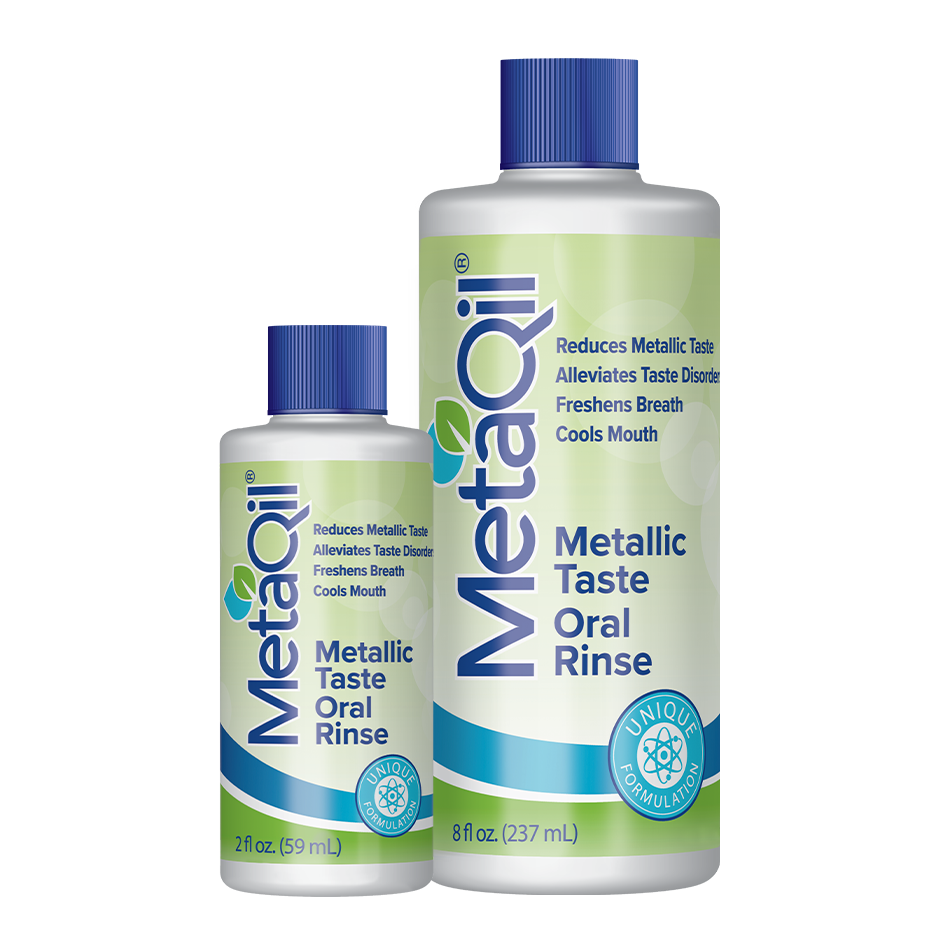
MetaQil is a first-of-its-kind product scientifically designed to alleviate metallic taste. MetaQil freshens breath and cools your mouth with no stingy feeling. Our innovative ingredients cool the mouth and provide instant, long-lasting relief and comfort for metallic taste symptoms.

